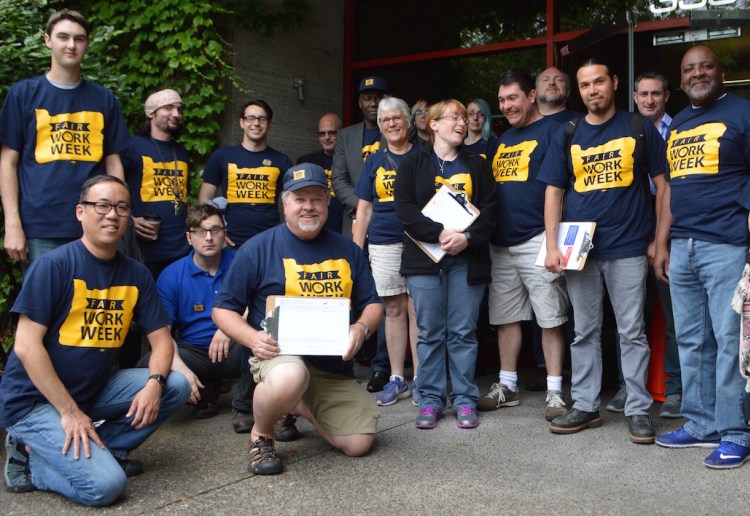

Share
Oregon has become the first state in the nation to crack down on a set of abusive scheduling practices that have become increasingly common at some large retail and food service chains.
The measure, SB828, applies to retail, hotel, and food service establishments with 500 or more employees worldwide. It will require employers to give employees two weeks’ notice of their work schedules, to pay for last-minute employer-requested schedule changes, and to separate shifts by at least 10 hours.
The bill pre-empts local governments from passing their own scheduling requirements. It will take effect July 1, 2018, with its penalty provisions taking effect Jan. 1, 2019. SB828 passed the state Senate 23-6 on June 22 and the House 46-13 on June 29, and Gov. Kate Brown (D) is expected to sign it shortly.
“This is an acute problem we are trying to solve,” State Rep. Ann Lininger, D-Lake Oswego, told her colleagues in a House floor speech, “and one that’s getting worse as businesses move to adopt scheduling software that allows them to make changes to workers’ schedules with less and less advance notice.”
“We had a bipartisan vote, and getting there took a lot of negotiating,” said Hannah Taube, state director of the union-backed Oregon Working Families Party. “But ultimately we have a bill that will help workers across the state in these industries have schedules they can depend on — so they can plan for child care, education, and doctor’s appointments, or balance second jobs.”
The bill was the top legislative priority for the state’s largest private sector union, United Food and Commercial Workers Local 555. Local 555 and the Oregon Working Families Party were prepared to take the issue to voters in 2018 via a ballot measure if the bill died in the legislature, and for a time, it looked like it would stall in the State Senate.
But sponsors credited Senate President Peter Courtney, D-Salem, for hashing out a compromise that brought previously reluctant Democrats and even a number of Republicans to support it in the end.
To win that majority, the bill was amended significantly. The original bill had provisions that applied to all employers and to small employers, and its strictest provisions would have applied to retail, hospitality and food-service establishments with 100 or more employees nationwide — including a requirement to offer additional hours to existing employees before hiring new employees or subcontractors.
Oregon’s passage of the so-called “Fair Workweek” law is likely to add momentum to similar efforts elsewhere. The City of San Francisco was the first to pass similar legislation, known as Retail Workers Bill of Rights, in 2014. That was followed by Seattle in 2016, and New York City in May 2017.
Groups working on raising the minimum wage and instituting earned safe and sick time policies in Minnesota have also identified abusive scheduling as an issue.
Under SB828, retail, hotel, and food service establishments in Oregon that have 500 or more employees worldwide must:
- Provide new hires with a written good-faith estimate of their work schedule.
- Post work schedules at least 7 days in advance (14 days after July 1, 2020).
- Provide at least 10 hours between work shifts (unless the employee requests or consents to work otherwise, in which case they earn time-and-a-half for hours worked less than 10 hours after the previous shift).
- Compensate employees for schedule changes: An extra hour of pay for each time more than 30 minutes is added to a shift, or the date or start time of a shift is changed with no loss of hours, or an additional work or on-call shift is added; and an extra half an hour of pay for each scheduled hour that an employee doesn’t end up working because the employer cancels a shift or changes the start or end time of a shift.
- Pay half-time for each hour that an employee is on-call but isn’t called in to work. The employers aren’t required to pay for schedule changes that employees initiate. And they can maintain a standby list of employees who are willing to work extra hours on short notice in case of unanticipated customer needs or unexpected employee absences.
This article was distributed by Press Associates Union News Service.

